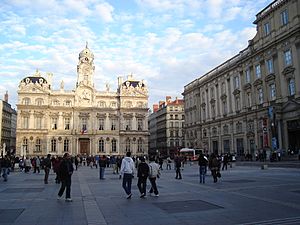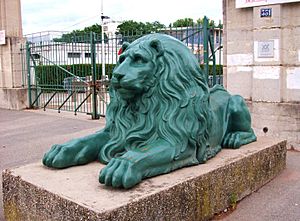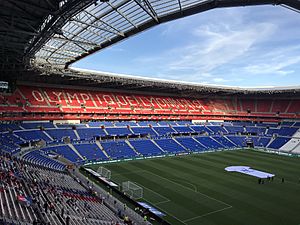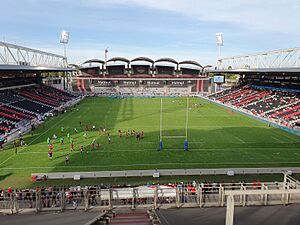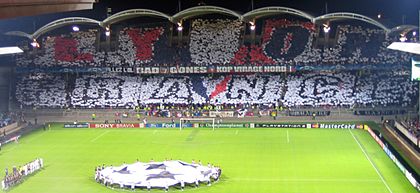Olympique Lyonnais facts for kids
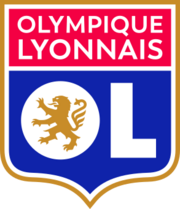 |
|||
| Full name | Olympique Lyonnais | ||
|---|---|---|---|
| Nickname(s) | Les Gones (The Kids) | ||
| Short name | Lyon OL |
||
| Founded | 26 May 1950 | ||
| Ground | Parc Olympique Lyonnais | ||
| Capacity | 59,186 | ||
| Owner | Eagle Football Group | ||
| President | Michele Kang | ||
| Head coach | Paulo Fonseca / Jorge Maciel (caretaker) | ||
| League | Ligue 1 | ||
| 2021–22 | Ligue 1, 8th of 20 | ||
|
|
|||
Olympique Lyonnais, often called Lyon or OL, is a professional football club from Lyon, France. The club started in 1899 and was officially founded in 1950. They play in Ligue 1, France's top football league. Lyon won their first Ligue 1 championship in 2002. They then set a national record by winning seven titles in a row!
The team has also won eight Trophée des Champions (a French Super Cup), five Coupe de France (French Cup), and three Ligue 2 titles. Lyon has played in the UEFA Champions League seventeen times. They reached the semi-finals in 2010 and 2020. Their home games are played at the Parc Olympique Lyonnais, also known as Groupama Stadium. This stadium can hold 59,186 fans. The club's colors are white, red, and blue.
Lyon's nickname, Les Gones, means "The Kids" in a local dialect. They have a big rivalry with nearby team AS Saint-Étienne, which is called the Derby rhônalpin. For many years, Jean-Michel Aulas owned Lyon. In December 2022, American businessman John Textor bought the club.
Contents
- Club History
- Club Ownership and Money
- Stadiums Where Lyon Plays
- Training Center
- Team Colors and Kits
- Supporters
- Team Statistics and Records
- Rivalries
- Sponsors
- Media
- Kit Suppliers and Shirt Sponsors
- UEFA Club Ranking
- Players
- Coaches
- Club Achievements
- Olympique Lyonnais Women's Team
- Images for kids
- See also
Club History
How Lyon Started (1899–1950)
In 1899, a football team called Olympique de Lyon was part of a bigger sports club. This club was called Lyon Olympique Universitaire (LOU). In the early days, the football part of the club was not as famous as another local team, FC Lyon.
There were many disagreements about whether amateur and professional players could be on the same team. Because of this, the club's manager, Félix Louot, decided to start a new club. After many meetings, about twenty people met on May 23, 1950. They decided on the name Olympique Lyonnais for the new club. They also chose the club's colors: red and blue. Days later, a local newspaper announced that the club was officially formed.
Early Wins (1950–1987)
On August 27, 1950, Lyon played its first official match. They won 3-0 against CA Paris-Charenton. Lyon's first goal was scored very quickly, in the first 40 seconds! Most of the players had played for LOU before. In only their second year, Lyon won the Division 2 championship in the 1950–51 season. This meant they moved up to Division 1 for the next season.
Lyon had some good success in the 1960s and 1970s. Famous players like Fleury Di Nallo and Bernard Lacombe played for them. In the 1963–64 season, Lyon won their first Coupe de France title. They beat Bordeaux 2-0. Later, under different managers, Lyon won the Coupe de France two more times, in 1967 and 1973.
Jean-Michel Aulas' Time as President (1987–2023)
In June 1987, a local businessman named Jean-Michel Aulas bought Lyon. He wanted to make Lyon a top team in France. His plan was to make the club famous across Europe within four years. The first manager under Aulas was Raymond Domenech. They quickly moved back into the first division and even qualified for the UEFA Cup.
Around the year 2000, Lyon became very successful in French football. They became the richest club in France. Lyon also became known for finding and developing talented young players. Many of these players became famous in France and around the world. Some examples include Michael Essien, Florent Malouda, Juninho, and Karim Benzema.
Lyon won their first ever Ligue 1 title in 2002. This started an amazing record of seven league titles in a row! During this time, they also won the Coupe de France in 2008, their first Coupe de la Ligue in 2001, and six Trophée des Champions. They also did well in European competitions, reaching the quarter-finals three times and the semi-finals of the UEFA Champions League in 2010. Lyon's winning streak ended in the 2008–09 season. In the 2011–12 season, Lyon won their fifth and most recent Coupe de France trophy.
Lyon also started investing in other sports. They had an esports team in China. In 2019, they bought a part of the local ASVEL basketball club. In 2020, they bought a large part of the U.S. National Women's Soccer League team, which was later renamed OL Reign.
In the 2019–20 season, Lyon finished seventh in the league. This was because the league was stopped early due to the coronavirus. They also reached the final of the Coupe de la Ligue but lost. This meant Lyon did not qualify for European competitions for the first time in 24 years. However, in the Champions League, Lyon did very well. They beat strong teams like Juventus and Manchester City to reach the semi-finals. They eventually lost to Bayern Munich.
After 36 years, Jean-Michel Aulas stepped down as president of Olympique Lyonnais on May 8, 2023. He had sold the club to American businessman John Textor in December 2022.
John Textor's Time as President (2023–2025)
In December 2022, John Textor's Eagle Group became the main owners of Lyon. They bought 77.49% of the club. At that time, Textor also owned other football clubs in Brazil, Belgium, and England.
On September 16, 2023, Fabio Grosso, a former player, became the head coach. However, the team was struggling, and Grosso left in November 2023 after only seven games. Academy coach Pierre Sage took over as interim coach. He led the team to finish sixth in the league, which meant they qualified for the 2024–25 Europa League season. In July 2024, Sage became the permanent coach. On January 27, 2025, Sage was replaced by Portuguese coach Paulo Fonseca. Fonseca helped Lyon finish 6th, qualifying them for the 2025–26 Europa League season.
During this time, the club sold its women's team, OL Lyonnes, and the LDLC Arena, an arena near Lyon's stadium. On June 24, 2025, Lyon was moved down to Ligue 2 by the DNCG (a French football financial watchdog) because of money problems.
Michele Kang's Presidency (2025–Present)
On June 30, 2025, Michele Kang became the new Chairwoman and CEO of Eagle Football Group and President of Olympique Lyonnais. She was already the president of OL Lyonnes. Just over two weeks later, on July 9, 2025, the decision to move Lyon down to Ligue 2 was reversed. This was because of actions taken by the club under Michele Kang's new leadership. Lyon will stay in Ligue 1.
Club Ownership and Money
Jean-Michel Aulas owned Olympique Lyonnais from June 1987. He helped the club get out of debt and made it one of the richest football clubs in the world. Some people criticized him for running the club too much like a business. During his time, the club's company, OL Groupe, was listed on the European Stock Exchange.
In April 2008, Forbes magazine said Lyon was the thirteenth most valuable football team in the world. In February 2009, Lyon was ranked 12th in the Deloitte Football Money League, earning a lot of money each year.
In 2016, a Chinese investment fund bought 20% of Olympique Lyonnais Group for €100 million. In December 2022, American businessman John Textor bought the majority of the club's shares. He became the new owner. On May 8, 2023, Textor replaced Aulas as the chairman and CEO of OL Groupe, ending Aulas' 36 years as president. Jean-Michel Aulas was made honorary chairman.
On July 13, 2023, Santiago Cucci became the interim executive president of OL Groupe, but he later resigned. Laurent Prud'homme replaced him until May 2025. After Lyon faced financial issues in June 2025, John Textor resigned. Michele Kang, who owned the women's team, was appointed as the new president. She successfully appealed the decision to move Lyon to Ligue 2, so the club remained in Ligue 1.
| Club management | ||||||||||||||||||||||||
|---|---|---|---|---|---|---|---|---|---|---|---|---|---|---|---|---|---|---|---|---|---|---|---|---|
|
Stadiums Where Lyon Plays
Stade de Gerland (1950–2015)
Olympique Lyonnais played at the Stade de Gerland for many years, from 1950 to 2015. The idea for this stadium came in 1910 from Lyon's mayor, Édouard Herriot. Construction started in 1914 and finished in 1919. By 1920, the stadium was ready.
In 1926, the Stade de Gerland opened with a capacity of 35,000 people. It was later recognized as a historic monument in 1967. Besides Lyon's games, the stadium hosted matches for major tournaments like the Euro 1984 and the 1998 World Cup. The stadium was updated over the years to hold more fans. Its record attendance was 48,552 during a derby game between Lyon and Saint-Étienne in 1980.
On December 5, 2015, Lyon played their last game at the Stade de Gerland. The stadium is now home to a rugby team, Lyon OU Rugby.
Parc Olympique Lyonnais (2016–Present)
On September 1, 2008, Lyon's president, Jean-Michel Aulas, announced plans for a new 60,000-seat stadium. It was first called OL Land. This new stadium was built in Décines-Charpieu, a suburb of Lyon. The project faced some delays due to paperwork and local disagreements.
On January 9, 2016, Lyon played their first game at the Parc Olympique Lyonnais. They won 4-1 against Troyes. Since 2017, a French insurance company, Groupama, has sponsored the stadium. Because of this, the Parc Olympique Lyonnais is now known as the Groupama Stadium. This partnership has been renewed several times.
Training Center
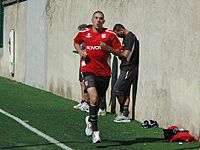
The Centre Tola Vologe was Lyon's training center and main office before 2016. It was named after Anatole Vologe, a Lyon sportsman who died during World War II. This center was known for its excellent training programs. Many famous players trained there, including Karim Benzema, Alexandre Lacazette, and Samuel Umtiti.
Now, both the men's and women's teams train at a modern complex next to the new Groupama Stadium. The youth academy also moved to a nearby town.
Team Colors and Kits
|
|
| Lyon won six of their seven league titles wearing this kit. |
Since Lyon started, their main colors have been red, blue, and white. White has always been the most common color. In the early years, Lyon mostly wore all-white uniforms. In 1955, they added a red and blue V-shape (chevron) and blue shorts.
In 1961, the V-shape was removed, and two horizontal red and blue stripes were added. Six years later, the club went back to all-white uniforms. But this time, the red and blue stripes were vertical and on the left side of the shirt. Lyon wore this style from the 1970–71 season until the 1975–76 season. For the 2002–03 season, the club brought back these kits. Lyon wore them, with some changes each year, for six of their seven straight league titles.
In 1976, the club changed their kits a lot, switching from all-white to all-red. They wore these red kits until the 1989–90 season. After that, they returned to all-white kits. In the 1995–96 season, they brought back vertical stripes, but placed them in the center of the shirt. This style lasted until the 2001–02 season. For the 2009–10 season, Lyon returned to horizontal red and blue stripes. In the UEFA Champions League, Lyon has used many different colors for their main kit, including red, navy blue, black, and silver.
Supporters
Olympique Lyonnais has many active fan groups. One of the most famous is Bad Gones ("Bad Kids"). This group started in 1987. They are known for their strong support in Europe because of Lyon's success in Ligue 1 and their regular appearances in the UEFA Champions League.
Another important fan group is Cosa Nostra Lyon. This group was formed in 2007 by combining two older groups. Other fan groups include the Hex@gones and the O'Elles Club. Lyon also has fan groups outside of the city of Lyon, like the Lyondoners in London.
Team Statistics and Records
| Player | Matches |
|---|---|
| |
542 |
| |
519 |
| |
494 |
| |
490 |
| |
489 |
| |
425 |
| |
412 |
| |
400 |
| Player | Goals |
| |
222 |
| |
201 |
| |
149 |
| |
132 |
| |
100 |
| |
95 |
| |
94 |
| |
94 |
Lyon's first official game was a 3–0 win on August 26, 1950. Since then, they have played over 50 seasons in Ligue 1, France's top football division. They have played over 1,800 matches in this league. Lyon achieved their 1,000th victory in the 2003–04 season.
The player with the most appearances for Lyon is Serge Chiesa, who played 541 matches over 14 seasons. Following him is former goalkeeper Grégory Coupet, who played 518 matches. Coupet and Sidney Govou are the only players in Lyon's history to win all four major French domestic titles. This includes all seven Ligue 1 titles, the 2008 Coupe de France, the 2001 Coupe de la Ligue, and six Trophée des Champions titles.
The club's all-time leading scorer is Fleury Di Nallo, who scored 222 goals from 1960 to 1974. Alexandre Lacazette holds the record for most goals in a single league season for Lyon, scoring 26 goals in the 2014–15 season.
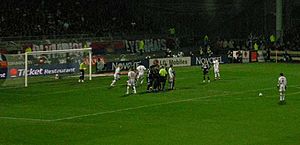
Lyon's biggest win was 10–0, which happened twice in the Coupe de France. Their biggest league win was 8–0, also on two occasions. In European competitions, Lyon's biggest win was 7–0 in the 1974–75 season.
Rivalries
Lyon has a long-standing rivalry with Saint-Étienne. Matches between these two clubs are called the Derby rhônalpin. This rivalry started in the 1960s. The two cities are close, and they have different historical backgrounds. Lyon is seen as a more financially comfortable city, while Saint-Étienne is known for its industrial, working-class roots. This derby is often one of the most exciting games of the Ligue 1 season.
Lyon also has rivalries with other top French clubs like Marseille, Bordeaux, Paris Saint-Germain, and Lille. The rivalry with Marseille is often called Choc des Olympiques ("Clash of the Olympics"). Both clubs are very strong in French football, and they often compete for the championship.
Sponsors
On August 7, 2009, Lyon signed a ten-year deal with the German sportswear brand Adidas. This deal started in the 2010–11 season. As of the 2024–25 season, Lyon still has a deal with Adidas that will last until the end of the 2028–29 season.
After the 2008–09 season, Lyon's long-term sponsorship deals with Accor and Renault Trucks ended. In July 2009, BetClic, an online betting company, agreed to sponsor Lyon's kits. However, due to French law, Lyon could not wear shirts with the BetClic logo in France. They wore sponsor-less shirts for French games but could wear the BetClic shirts outside France. In January 2010, Lyon got a sponsorship deal with Sony Computer Entertainment to show the PlayStation logo on their shirts.
In 2010, the French law changed, allowing online gambling advertising. Lyon then started wearing their BetClic-sponsored shirts in France. In August 2012, the club signed a two-year sponsorship deal with Korean car company Hyundai. Hyundai replaced BetClic as the main shirt sponsor for Ligue 1 matches. Since 2020, Lyon has been sponsored by Emirates.
Media
On July 27, 2005, the club launched OLTV, a 24/7 TV channel completely dedicated to club programs and events. It also showed matches for the reserve and women's teams. In 2021, OLTV was renamed OL Play.
Kit Suppliers and Shirt Sponsors
| Period | Kit manufacturer | Shirt sponsor |
|---|---|---|
| 1950–1984 | In-House | None |
| 1984–1991 | Duarig | Giraudy Affichage |
| Le69 | ||
| Zenith Datasystem | ||
| Canal+ | ||
| Candia | ||
| 1991–1995 | Nike | Sodexho |
| Justin Bridou | ||
| Candia | ||
| 1995–2002 | Adidas | Pathé |
| Infogrames | ||
| Continental | ||
| 2002–2010 | Umbro | Renault Trucks |
| LG | ||
| Ticket Restaurant | ||
| Novotel | ||
| PlayStation 3 | ||
| 2010–2025 | Adidas | Betclic |
| Everest Poker | ||
| Renault Trucks | ||
| Crédit Agricole | ||
| Hyundai | ||
| Veolia Environnement | ||
| Emirates |
- If there were multiple shirt sponsors in a season, different sponsors would appear on different kits (home, away, alternate).
UEFA Club Ranking
Lyon's highest UEFA club ranking was 8th place in the 2007–08 season. As of July 15, 2025, Lyon is ranked 51st in Europe.
| Rank | Team | Points |
|---|---|---|
| 49 | 44.875 | |
| 50 | 44.000 | |
| 51 | 43.750 | |
| 52 | 42.250 | |
| 53 | 42.000 |
Players
Current Squad
|
|
Reserve Squad
|
|
Retired Numbers
Sometimes, football clubs retire jersey numbers to honor special players.
- 16 – This number was retired in 1999 for goalkeeper Luc Borrelli. He sadly died in a car accident. In 2011, the number was given to Anthony Lopes and has been used again since then.
- 17 – This number was retired in 2003 for midfielder Marc-Vivien Foé. He passed away while playing for Cameroon at Lyon's stadium. The number was brought back in 2008 for another Cameroonian player, Jean Makoun. It was later given to Alexandre Lacazette in 2011 and has been used again.
Award-Winning Players
Several Lyon players have won important awards:
- UNFP Player of the Year:
 Michael Essien – 2005
Michael Essien – 2005 Juninho – 2006
Juninho – 2006 Florent Malouda – 2007
Florent Malouda – 2007 Karim Benzema – 2008
Karim Benzema – 2008 Lisandro López – 2010
Lisandro López – 2010 Alexandre Lacazette – 2015
Alexandre Lacazette – 2015
- UNFP Young Player of the Year:
 Florian Maurice – 1995
Florian Maurice – 1995 Sidney Govou – 2001
Sidney Govou – 2001 Hatem Ben Arfa – 2008
Hatem Ben Arfa – 2008 Nabil Fekir – 2015
Nabil Fekir – 2015
- UNFP Goalkeeper of the Year:
 Grégory Coupet – 2003, 2004, 2005, 2006
Grégory Coupet – 2003, 2004, 2005, 2006 Hugo Lloris – 2009, 2010, 2012
Hugo Lloris – 2009, 2010, 2012
- Bravo Award:
 Karim Benzema – 2008
Karim Benzema – 2008
Coaches

Olympique Lyonnais has had 22 permanent coaches since 1950. The first coach was Oscar Heisserer. The coach who stayed the longest was Aimé Mignot, who coached Lyon for eight years. Alain Perrin was the first Lyon coach to win both the league and the French Cup in the same season.
Current Coaching Staff
- As of January 31, 2025
| Position | Name |
|---|---|
| Head coach | |
| Assistant head coach | |
| Goalkeeping coach | |
| Fitness coaches | |
| Video analysts | |
| Data analysts | |
| Head of Medical | |
| Doctors | |
| Physiotherapists | |
| Nutritionist | |
| Reserves coach | |
| Team managers | |
| Kit manager | |
| Assistant kit managers |
Club Achievements
Lyon has won many titles in French football history. They have won Ligue 1 seven times, including a record-breaking seven titles in a row starting in 2001–02. The club has also won Ligue 2 three times, five Coupe de France titles, one Coupe de la Ligue title, and eight Trophée des Champions.
In European competitions, Lyon has reached the semi-finals of the UEFA Champions League twice, in 2009–10 and 2019–20. They also won the UEFA Intertoto Cup in 1997.
Domestic Titles
League Titles
- Ligue 1
- Winners (7): 2001–02, 2002–03, 2003–04, 2004–05, 2005–06, 2006–07, 2007–08
- Runners-up (5): 1994–95, 2000–01, 2009–10, 2014–15, 2015–16
- Ligue 2
- Winners (3): 1950–51, 1953–54, 1988–89
Cup Titles
- Coupe de France
- Winners (5): 1963–64, 1966–67, 1972–73, 2007–08, 2011–12
- Runners-up (4): 1962–63, 1970–71, 1975–76, 2023–24
- Coupe de la Ligue
- Winners (1): 2000–01
- Runners-up (5): 1995–96, 2006–07, 2011–12, 2013–14, 2019–20
- Trophée des Champions
- Winners (8): 1973, 2002, 2003, 2004, 2005, 2006, 2007, 2012
- Runners-up (4): 1967, 2008, 2015, 2016
International Competitions
- UEFA Champions League
- Semi-finalists (2): 2009–10, 2019–20
- UEFA Europa League
- Semi-finalists (1): 2016–17
- UEFA Cup Winners' Cup
- Semi-finalists (1): 1963–64
- UEFA Intertoto Cup
- Winners (1): 1997
Olympique Lyonnais Women's Team
The Olympique Lyonnais women's team, renamed OL Lyonnes in 2025, plays in France's top women's league, Division 1 Féminine. The women's team started as part of another club in the 1970s. They joined OL in 2004. They mostly train and play at the Groupama OL Training Center. Since 2025, they also share the main Groupama Stadium as their home ground.
Women's Team Achievements
The Lyon women's team is known as one of the most successful women's football clubs in the world. They have won 18 French league titles, 10 French cups, and 8 European (UEFA Women's Champions League) titles.
Images for kids
-
Former Lyon player Karim Benzema training at the Centre Tola Vologe.
-
Juninho scored a record 44 free kicks for Lyon
See also
 In Spanish: Olympique de Lyon para niños
In Spanish: Olympique de Lyon para niños
 | DeHart Hubbard |
 | Wilma Rudolph |
 | Jesse Owens |
 | Jackie Joyner-Kersee |
 | Major Taylor |


